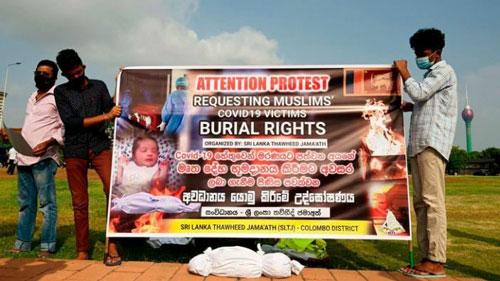Colombo
The forced cremation of a 20-day-old Muslim baby in Sri Lanka has highlighted the government’s controversial order to burn the bodies of all those who died of Covid. Critics say the decision is not based in science and only intended to target the minority community. BBC Sinhala’s Saroj Pathirana reports.
Mohamed Fahim and his wife Fathima Shafna were thrilled when their baby boy Shaykh was born on 18 November after a six-year wait. But their joy was short-lived. On the night of 7 December, they noticed the baby was struggling to breathe. They rushed him to the capital Colombo’s best children’s hospital, the Lady Ridgeway.
“They told us the baby was in a severe condition and was suffering from pneumonia. But then, around midnight, they did an antigen test and told us the baby was positive for coronavirus,” Mohamed Fahim, who drives a three-wheeler for a living, told BBC Sinhala. Doctors then tested Mr Fahim and his wife but they were both negative. “I asked how my baby was positive when both of us, even the mother who was breastfeeding him, were negative?”
Despite tears and pleas, the anxious couple were sent home by officials who said more tests were needed. They were told to call the hospital for updates.
The next day, they were informed that their baby had died of Covid. Mr Fahim repeatedly asked doctors to conduct a PCR test to reconfirm this, but they refused.
Then, doctors asked him to sign a document authorising the cremation of their child, as required by law in Sri Lanka.
Mr Fahim refused: the cremation of bodies is forbidden in Islam, considered a form of mutilation, forbidden by Allah. Muslims also believe in the resurrection of the physical body, and cremation is thought to prevent this.
And he is not alone. Some Muslim families have refused to claim the bodies of their dead, leaving the government to cremate them on state expense, while many will not accept the ashes of their loved ones.—Reuters










